Dia de los angelitos meaning – Dia de los Angelitos, a poignant and heartfelt tradition observed in Latin American countries, holds profound significance as a day dedicated to honoring and remembering deceased children. This day, steeped in cultural and religious beliefs, offers a glimpse into the deep bonds that transcend the physical realm, providing solace and a sense of connection for bereaved families.
Rooted in the Catholic tradition, Dia de los Angelitos is celebrated on November 1st, coinciding with the Day of All Saints and the Day of the Dead. It is believed that on this day, the souls of departed children descend from heaven to visit their loved ones, bringing with them joy and a reminder of their eternal presence.
Cultural Significance
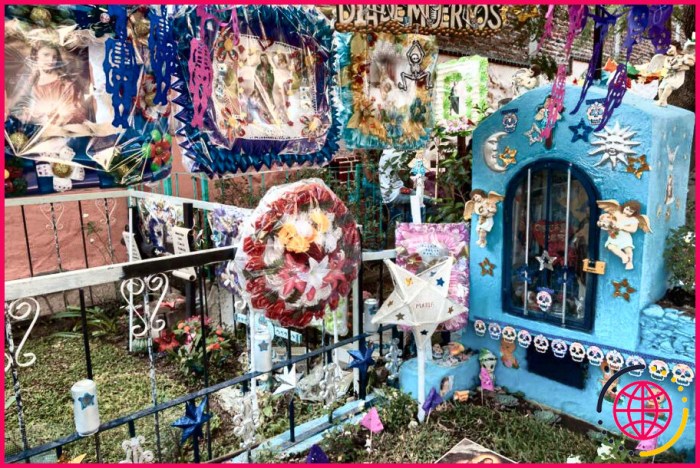
Día de los Angelitos, also known as the Day of the Little Angels, is a significant cultural and religious holiday celebrated in various countries, particularly in Latin America and the Philippines. It is a day dedicated to honoring and remembering deceased children and infants.The
origins of Día de los Angelitos can be traced back to pre-Columbian times, with indigenous cultures honoring the spirits of deceased children. After the arrival of Catholicism, the holiday blended with Christian traditions, leading to the belief that deceased children become angels in heaven.
Religious Beliefs and Practices
Día de los Angelitos holds deep religious significance, rooted in the belief that deceased children become angels who intercede between the living and the divine. This belief is reflected in various rituals and customs observed during the celebration.
Families often visit cemeteries on this day to pay respects to their departed children, bringing flowers, candles, and toys as offerings. They pray for their souls, seeking their protection and guidance. Some families also hold special masses or prayers in their homes or churches, dedicating them to the memory of their lost loved ones.
Rituals and Customs
One of the most common rituals is the creation of altars or shrines in homes. These altars are adorned with photographs of the deceased children, along with candles, flowers, and other mementos. Families often spend time at these altars, praying and sharing stories about their beloved children.
Another significant custom is the preparation of special foods and treats. In some cultures, families make tamales, atole, or other traditional dishes to honor the deceased children. These foods are believed to bring comfort and sustenance to the spirits of the departed.
Symbolism and Imagery
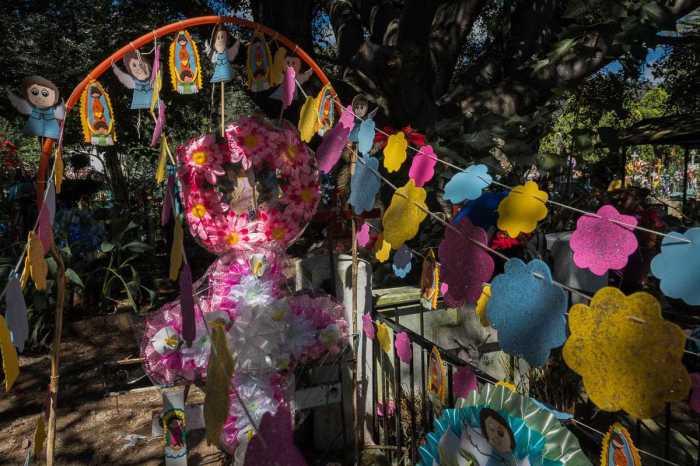
Día de los Angelitos is imbued with profound symbolism and imagery that encapsulates the essence of the holiday and its spiritual significance.
One of the most prevalent symbols is the angel, representing the departed children who are believed to be celestial beings watching over their loved ones. Angels are often depicted with wings, symbolizing their ability to transcend the earthly realm and connect with the divine.
Colors
The color white is prominently featured, symbolizing purity, innocence, and the celestial realm where the angelitos reside. Blue and pink are also commonly used, representing the traditional colors associated with baby boys and girls, respectively.
Flowers
Flowers play a significant role in the symbolism of Día de los Angelitos. White lilies, in particular, are associated with purity and innocence, while other flowers such as roses and chrysanthemums represent love, remembrance, and hope.
Candles
Candles are lit in remembrance of the departed children, symbolizing the light that guides their souls in the afterlife. The flickering flames represent the eternal presence of the angelitos in the hearts of their loved ones.
Music
Music is an integral part of Día de los Angelitos, with traditional lullabies and songs dedicated to the departed children. The melodies evoke a sense of comfort, nostalgia, and connection between the living and the dead.
Historical Evolution: Dia De Los Angelitos Meaning
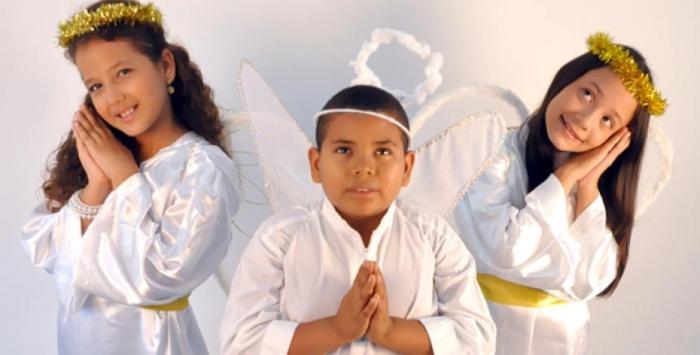
Día de los Angelitos, like many other Mexican traditions, has undergone significant changes and adaptations over time. Its origins can be traced back to pre-Hispanic beliefs and practices, but it has also been influenced by Spanish Catholicism and other cultural factors.
In pre-Hispanic times, it was believed that children who died before reaching adulthood were not fully developed and were therefore unable to enter the afterlife. They were often buried in special areas of the cemetery and were given offerings of food, toys, and other objects to help them on their journey to the next world.
After the arrival of the Spanish, these pre-Hispanic beliefs were combined with Catholic traditions, and the celebration of Día de los Angelitos began to take on its present-day form. The Catholic Church designated November 1st as the Day of the Dead for children, and the tradition of offering food, toys, and other gifts to the deceased children became a central part of the celebration.
Modern Adaptations
In recent years, Día de los Angelitos has continued to evolve and adapt to changing cultural norms. Today, the celebration is often more focused on remembering and honoring the lives of deceased children rather than on the belief that they are in need of assistance in the afterlife.
Families often visit the graves of their deceased children on Día de los Angelitos and decorate them with flowers, candles, and other offerings. They may also share stories about the child’s life and sing songs in their memory.
Regional Variations
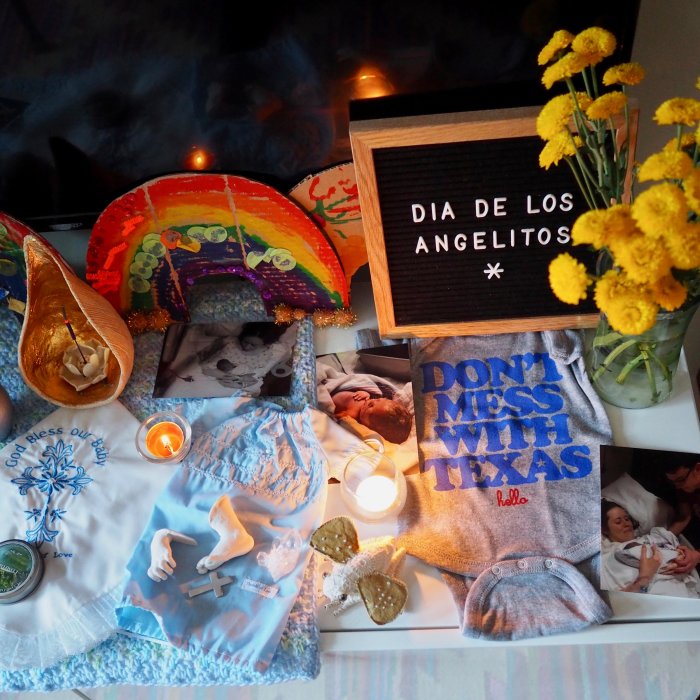
Día de los Angelitos is celebrated in various regions with unique traditions and practices.
Dia de los Angelitos, a poignant day honoring deceased children, holds deep cultural significance. Its observance offers a window into the complexities of grief and remembrance. For those navigating medical coding, understanding ICD codes is crucial, as seen in assignment 1.1 icd coding 1 . This task delves into the nuances of ICD-10-CM codes, equipping learners with essential skills for accurate medical recordkeeping.
Returning to Dia de los Angelitos, its traditions and rituals serve as a testament to the enduring bond between the living and the departed.
In Mexico, the festival is widely observed, and families construct elaborate altars adorned with candles, flowers, and the favorite toys and treats of the deceased children. They also visit cemeteries to pay respects and leave offerings.
Guatemala
- In Guatemala, the celebration is known as “El Día de los Muertitos” and focuses on honoring deceased children.
- Families create small altars with candles, flowers, and food offerings, and visit cemeteries to pray and remember their loved ones.
El Salvador
- In El Salvador, the day is called “Día de los Inocentes” and is celebrated with kite-flying and fireworks.
- Families believe that the souls of deceased children return to earth in the form of doves, and they release kites to symbolize their flight.
Honduras
- In Honduras, the festival is known as “Día de los Difuntos” and is observed with visits to cemeteries, prayers, and offerings of flowers and candles.
- Families also gather for special meals and share stories about their deceased loved ones.
Nicaragua
- In Nicaragua, the day is called “Día de los Santos Inocentes” and is celebrated with colorful processions and traditional music.
- Families create altars with candles, flowers, and offerings of toys and candy, and visit cemeteries to pay respects.
Social and Emotional Impact
Día de los Angelitos has a profound social and emotional impact on individuals and communities. It fosters a sense of remembrance and connection, bringing people together to honor and cherish the memory of departed children.
The celebration provides an opportunity for families to grieve collectively and find solace in shared experiences. It creates a sense of community, reminding individuals that they are not alone in their grief and that their loved ones are remembered and celebrated.
Sense of Remembrance
The celebration serves as a reminder of the lives of the departed children, preserving their memory and honoring their existence. Families create altars adorned with photos, toys, and favorite items of the deceased, creating a tangible connection to their presence.
Emotional Healing
The ritualistic aspects of the celebration, such as lighting candles, praying, and sharing stories, provide a cathartic experience for families. It allows them to express their emotions and find comfort in the collective remembrance of their loved ones.
Modern Interpretations
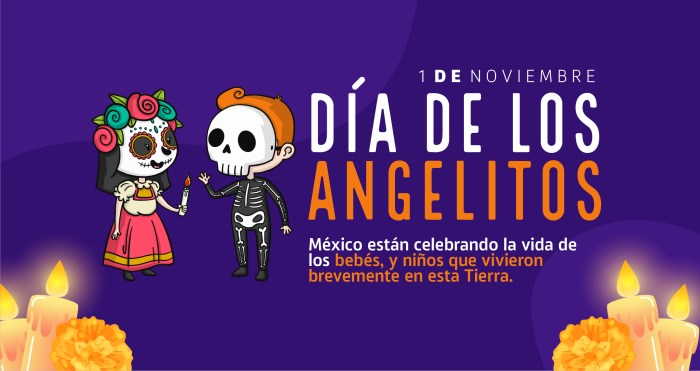
Día de los Angelitos is a traditional holiday that has evolved over time to reflect the changing cultural and social landscape. In contemporary society, the holiday continues to be observed with reverence, but it has also been adapted to suit modern sensibilities.
One notable modern interpretation is the increased focus on remembering and honoring all children who have passed away, regardless of their religious affiliation or cause of death. This inclusive approach reflects the growing awareness of the profound grief experienced by parents and families who have lost a child.
Commemorative Events
- Memorial services and candlelight vigils are held in churches, cemeteries, and community centers to honor the memory of deceased children.
- Parents and families create online memorials, share stories, and support each other through social media groups dedicated to bereaved parents.
Educational Initiatives, Dia de los angelitos meaning
- Schools and community organizations host educational programs to raise awareness about childhood bereavement and provide support to grieving children and their families.
- Books, articles, and resources are published to help parents and educators understand and address the unique needs of bereaved children.
Artistic Expressions
- Artists create paintings, sculptures, and other works of art that explore the themes of childhood loss and remembrance.
- Musicians compose songs and perform concerts to honor the memory of deceased children and provide comfort to grieving families.
FAQ Overview
What is the significance of Dia de los Angelitos?
Dia de los Angelitos is a day dedicated to honoring and remembering deceased children, offering solace and a sense of connection for bereaved families.
When is Dia de los Angelitos celebrated?
Dia de los Angelitos is celebrated on November 1st, coinciding with the Day of All Saints and the Day of the Dead.
What are some of the traditions associated with Dia de los Angelitos?
Traditions associated with Dia de los Angelitos include visiting cemeteries, decorating graves with flowers and toys, and lighting candles to guide the souls of departed children.